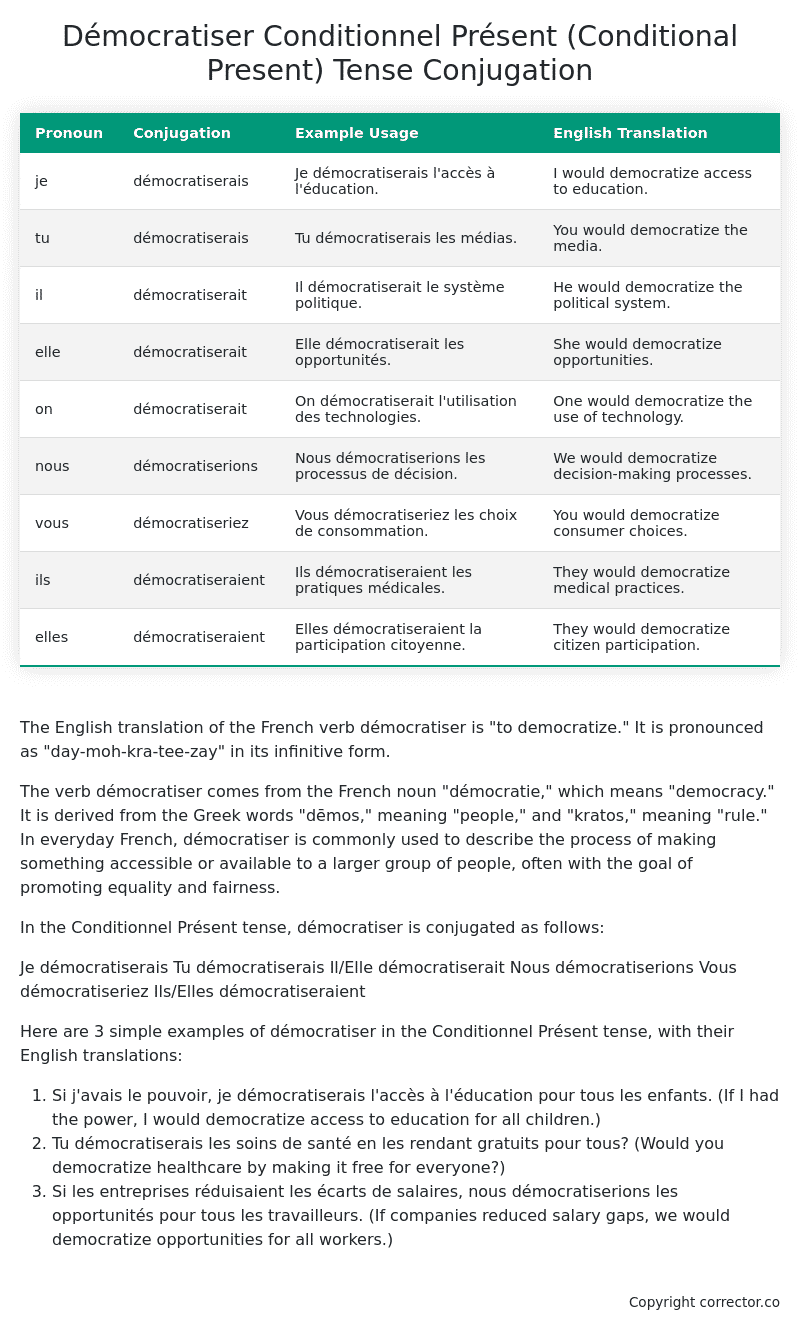Conditionnel Présent (Conditional Present) Tense Conjugation of the French Verb démocratiser
Introduction to the verb démocratiser
The English translation of the French verb démocratiser is “to democratize.” It is pronounced as “day-moh-kra-tee-zay” in its infinitive form.
The verb démocratiser comes from the French noun “démocratie,” which means “democracy.” It is derived from the Greek words “dēmos,” meaning “people,” and “kratos,” meaning “rule.” In everyday French, démocratiser is commonly used to describe the process of making something accessible or available to a larger group of people, often with the goal of promoting equality and fairness.
In the Conditionnel Présent tense, démocratiser is conjugated as follows:
Je démocratiserais
Tu démocratiserais
Il/Elle démocratiserait
Nous démocratiserions
Vous démocratiseriez
Ils/Elles démocratiseraient
Here are 3 simple examples of démocratiser in the Conditionnel Présent tense, with their English translations:
- Si j’avais le pouvoir, je démocratiserais l’accès à l’éducation pour tous les enfants. (If I had the power, I would democratize access to education for all children.)
- Tu démocratiserais les soins de santé en les rendant gratuits pour tous? (Would you democratize healthcare by making it free for everyone?)
- Si les entreprises réduisaient les écarts de salaires, nous démocratiserions les opportunités pour tous les travailleurs. (If companies reduced salary gaps, we would democratize opportunities for all workers.)
Table of the Conditionnel Présent (Conditional Present) Tense Conjugation of démocratiser
| Pronoun | Conjugation | Example Usage | English Translation |
|---|---|---|---|
| je | démocratiserais | Je démocratiserais l’accès à l’éducation. | I would democratize access to education. |
| tu | démocratiserais | Tu démocratiserais les médias. | You would democratize the media. |
| il | démocratiserait | Il démocratiserait le système politique. | He would democratize the political system. |
| elle | démocratiserait | Elle démocratiserait les opportunités. | She would democratize opportunities. |
| on | démocratiserait | On démocratiserait l’utilisation des technologies. | One would democratize the use of technology. |
| nous | démocratiserions | Nous démocratiserions les processus de décision. | We would democratize decision-making processes. |
| vous | démocratiseriez | Vous démocratiseriez les choix de consommation. | You would democratize consumer choices. |
| ils | démocratiseraient | Ils démocratiseraient les pratiques médicales. | They would democratize medical practices. |
| elles | démocratiseraient | Elles démocratiseraient la participation citoyenne. | They would democratize citizen participation. |
Other Conjugations for Démocratiser.
Le Present (Present Tense) Conjugation of the French Verb démocratiser
Imparfait (Imperfect) Tense Conjugation of the French Verb démocratiser
Passé Simple (Simple Past) Tense Conjugation of the French Verb démocratiser
Passé Composé (Present Perfect) Tense Conjugation of the French Verb démocratiser
Futur Simple (Simple Future) Tense Conjugation of the French Verb démocratiser
Futur Proche (Near Future) Tense Conjugation of the French Verb démocratiser
Plus-que-parfait (Pluperfect) Tense Conjugation of the French Verb démocratiser
Passé Antérieur (Past Anterior) Tense Conjugation of the French Verb démocratiser
Futur Antérieur (Future Anterior) Tense Conjugation of the French Verb démocratiser
Subjonctif Présent (Subjunctive Present) Tense Conjugation of the French Verb démocratiser
Subjonctif Passé (Subjunctive Past) Tense Conjugation of the French Verb démocratiser
Subjonctif Imparfait (Subjunctive Imperfect) Tense Conjugation of the French Verb démocratiser
Conditionnel Présent (Conditional Present) Tense Conjugation of the French Verb démocratiser (this article)
Conditionnel Passé (Conditional Past) Tense Conjugation of the French Verb démocratiser
L’impératif Présent (Imperative Present) Tense Conjugation of the French Verb démocratiser
L’infinitif Présent (Infinitive Present) Tense Conjugation of the French Verb démocratiser
Struggling with French verbs or the language in general? Why not use our free French Grammar Checker – no registration required!
Get a FREE Download Study Sheet of this Conjugation 🔥
Simply right click the image below, click “save image” and get your free reference for the démocratiser Conditionnel Présent tense conjugation!

Démocratiser – About the French Conditionnel Présent (Conditional Present) Tense
Formation
Common Everyday Usage Patterns
Expressing Polite Requests
Expressing Hypothetical Situations
Expressing Doubt or Uncertainty
Interactions with Other Tenses
Present Tense
Past Tense
Future Tense
Conditional Perfect
Summary
Want More?
I hope you enjoyed this article on the verb démocratiser. Still in a learning mood? Check out another TOTALLY random French verb conjugation!


